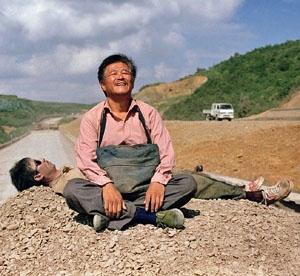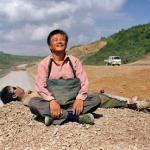High Ambitions in the Himalayas
A Documentary by Curt Dowdy
Country: USA
Life takes on a whole new meaning at 27,000 feet, as an expedition of hardy mountaineers tackle Cho Oyu, Everest's neighbor and the world's sixth-highest peak. The cast of climbers includes: Filmmaker Curt Dowdy (USA), a former Hewlitt-Packard executive and Internet entrepreneur; Dr. John Taske (Australia), a survivor of the 1996 Mt. Everest tragedy; Hall Wendel (USA), a seven summit climber (Everest, Aconcagua, Denali, Kilimanjaro, Elbrus, Vinson Massif, Carstensz Pyramid, and Kosciuszko); Raymond Behm (Luxemborg), Iron Man Triathlon athlete (Hawaii's three endurance events, including consecutively a 2.4 mile ocean swim, a 112 mile bike ride, and a 26.2 mile marathon); Bernhard Dobler, Austrian mountaineer, and Dietmar Voss, Australian mountaineer.
With the guidance of sherpas Ang Dorjee and Ang Tsering, the six men begin their journey with a hike to the Cho Oyu base camp at 18,700 feet. Farther up the slopes, there are three more camps, one at 20,700 feet, a second at 23,000 feet, and a third at 25,000 feet. Before they challenge the summit, over the course of about three weeks, the expedition will embark upon a series of three acclimatization exercises, during which they climb progressively higher and then return to base camp, which enables their bodies to adapt to reduced oxygen levels at extreme altitudes.
Foreboding reports of a Korean expedition leader who died of altitude sickness, and a Swedish woman who suffered a stroke, overshadow their trek to the summit, and each climber faces his own limitations as well. Dietmar Voss struggles for breath, Hall Wendel is hobbled by bursitis in his left knee, and Raymond Behm loses forward momentum within a few hundred feet of their lofty destination. In the words of Sir Edmund Hillary, "It is not the mountain that we conquer, but ourselves."
Even with the endurance and courage of the climbers as its focus, perhaps the most impressive elements of this film are the constant yet unobtrusive presence of the filmmaker and the nimble sherpas, who traverse the forbidding slopes of Cho Oyu seemingly unfazed. Both remain outside the perimeter of the spotlight that has been cast upon the travails of the climbers, seeking no glory for themselves. For the sherpas, it was just one of many trips up the mountain; and Curt Dowdy not only climbed Cho Oyu, but also filmed a powerful and compelling documentary in the process. A commendable feat indeed.
 ThingsAsian
ThingsAsian

















